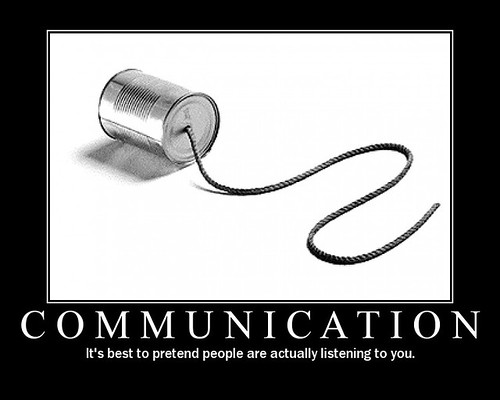Resolving interpersonal conflicts
As mentioned in my previous post on the importance of developing effective communication skills, one major consequence due to the lack of it is the onset of interpersonal conflicts between individuals. These conflicts can be very devastating in many relationships, because if these are left unresolved or resolved unsatisfactorily, it might lead to relational breakdowns. Here in this post, I would like to relate to the readers on one of my experiences in such matters.
This happened sometime back when I had a conflict with my boyfriend. He had promised me that he would attend my friend’s birthday party together with me. But in the end, he stood down on his promise. He had actually fallen ill a week prior to the birthday party but a few days before the party he already had a marked improvement in his health and he had almost recovered entirely. But on the actual day itself, it was raining heavily. I asked him if he still wants to attend the party and he say he would attend. Then an hour before our meeting time,he called me to tell me that he don’t feel like going because of the downpour as getting drench might cause a relapse in his illness. I was very angry with him, not for not showing up for the party itself, but I think he was just giving excuses not to go. We had a minor conflict on that but we both stand strong on our arguments. This standoff lasted for days before he apologise and admitted his guilt.
This entire episode aligns closely with an analogy one of my close friends had shared with me. He told me that relationship of any kind, particularly those of BGRs, is like the diplomacy of two hostile nations situated side-by-side each other (Yes, I know it is strange to make analogy of a loving relationship with two hostile nations fighting each other). The two nations are constantly aware of their own national borders, while both try their best to invade the other’s territory in order to expand their own border. Border skirmishes occur regularly to cause a shifting of border and with the conclusion of these skirmishes, a winner is determined by how much more border space he or she gains. Interpersonal conflicts are something as similar. We get into a conflict because we have different values, beliefs and most importantly, expectations, much like what hostile nations do.
Resolving the conflicts can likewise be analogise by the same example. In the case of the two warring nation, a solution to the hostilities can be achieved either when a winner emerges or when a compromise can be struck out. Similarly, resolving a interpersonal conflict can usually be resolved when there is either accommodation, compromise, avoidance or collaboration.
For the readers of my blog, do you think that what my boyfriend did to resolve the conflict was appropriate?
This happened sometime back when I had a conflict with my boyfriend. He had promised me that he would attend my friend’s birthday party together with me. But in the end, he stood down on his promise. He had actually fallen ill a week prior to the birthday party but a few days before the party he already had a marked improvement in his health and he had almost recovered entirely. But on the actual day itself, it was raining heavily. I asked him if he still wants to attend the party and he say he would attend. Then an hour before our meeting time,he called me to tell me that he don’t feel like going because of the downpour as getting drench might cause a relapse in his illness. I was very angry with him, not for not showing up for the party itself, but I think he was just giving excuses not to go. We had a minor conflict on that but we both stand strong on our arguments. This standoff lasted for days before he apologise and admitted his guilt.
This entire episode aligns closely with an analogy one of my close friends had shared with me. He told me that relationship of any kind, particularly those of BGRs, is like the diplomacy of two hostile nations situated side-by-side each other (Yes, I know it is strange to make analogy of a loving relationship with two hostile nations fighting each other). The two nations are constantly aware of their own national borders, while both try their best to invade the other’s territory in order to expand their own border. Border skirmishes occur regularly to cause a shifting of border and with the conclusion of these skirmishes, a winner is determined by how much more border space he or she gains. Interpersonal conflicts are something as similar. We get into a conflict because we have different values, beliefs and most importantly, expectations, much like what hostile nations do.
Resolving the conflicts can likewise be analogise by the same example. In the case of the two warring nation, a solution to the hostilities can be achieved either when a winner emerges or when a compromise can be struck out. Similarly, resolving a interpersonal conflict can usually be resolved when there is either accommodation, compromise, avoidance or collaboration.
For the readers of my blog, do you think that what my boyfriend did to resolve the conflict was appropriate?


